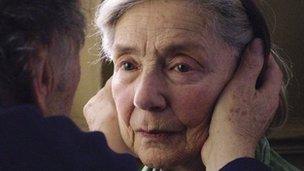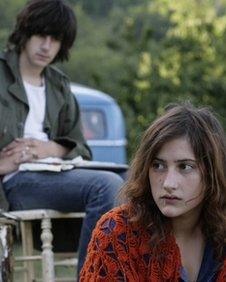French films woo British audiences
- Published

The British really only get to see the best French films - such as Amour
French cinema is enjoying its biggest box office success in Britain for a decade, with attendance for French language or French-made films in 2012 up by 157% on the previous year.
In the week where the world's most prestigious film festival gets underway at Cannes, the figures, compiled by cinema organisation Unifrance, show that 8m tickets were sold in the UK last year to see French films, making up 4.6% of the market.
Unifrance, which promotes the French movie industry abroad, describes 2012 as "an unique year for French cinema in Britain" but says the increase is not purely attributable to the success of The Artist, the silent film by director Michel Hazanavicius, which won five Oscars, seven Baftas and made in the region of £100m in box office profits worldwide.
"The figures aren't down to any one film," says spokesperson Sophie Bataille. "The Artist was responsible for 1.6m admissions, but films like Amour, which also won an Oscar, plus Rust and Bone starring Marion Cotillard, and a film like Untouchable, all did very well. The French-produced blockbuster Taken 2, starring Liam Neeson, also boosted profits."

Comedy Populaire is one of this year's French films trying its luck on the British market
Jason Wood, the Director of Programming at Curzon cinemas, which specialises in European and arthouse films, says that while London remains the hub for audiences seeking foreign-language cinema, the cultural appetite for this kind of cinema has grown across the UK, particularly in cities like Manchester, Glasgow and Liverpool.
"This really is the time for French film-makers," he says. "What has happened over the last year and a half is that France has produced some extremely high quality films that have been both critical and commercial hits.
"Some, like Rust and Bone, have an actor like Marion Cotillard attached, who is a worldwide star no matter what language she works in. Then you have a film like Michael Haneke's Amour, which goes beyond appealing to the typical London intelligencia who go to see foreign languages movies. These are stories that speak to everyone."
International 'language'
Director Francois Ozon, who released his latest film, In The House, in the UK last month, believes the cross-cultural exchange between the two countries is more fluid.
"It's even been proposed to me to set a film in Britain," he says. "It's certainly easier to sell my films over here and know it will find its audience."

Will Something in the Air about young revolutionaries be too 'French' for the British?
According to Charlotte Saluard, the Director of Programming at Cine Lumiere in London, steady box office success means more French titles available in the future.
This month sees the release of Populaire, a romantic comedy by first time director Regis Roinsard, starring Roman Duris and Deborah Francois; plus Something in the Air, a tale of young revolutionaries by Olivier Assayas, the maker of 2004's Paris Je T'Aime.
"Big film distributors are now willing to try their luck," says Saluard, "which frees these films from being seen as just for a 'niche' market. Lionsgate, which make The Hunger Games, will release Blood Ties, by the director Guillaume Canet. It's one of the easiest titles to bet on, as it has an international cast including Clive Owen, but it would have been unthinkable until recently."
Deborah Francois, the star of Populaire, a comedy about a secretary and her boss that parodies those of Hollywood in the 1950s, believes it is the success of The Artist that has opened up doors for her film:
"The Artist was technically a French film, but set in Hollywood, and even though it was silent it spoke an international language. Any good film, no matter where it's made, should travel and find its public."
Despite an estimated 600,000 French nationals living in London, Saluard estimates 70% of her audience at the Cine Lumiere is British.
"And I increasingly see them willing to take risks with what they see, but we still can't market anything as too 'French', that still doesn't work.

The British really only get to see the best French films - such as Amour
"Studio Canal, who released both A Prophet and Rust and Bone, both by Jacques Audiard, had a clever strategy with the first trailers of both those films. They didn't have a word of French in them.
"So it helped market A Prophet as a prison thriller, which is what it is, rather than a foreign-language film with subtitles. It's small strategies like this that are increasing the audience. It's funny that any film that comes from France is automatically seen as 'arthouse.' Populaire is actually a big blockbuster at home."
With no British director competing at Cannes this year for cinema's highest honour, the Palme D'Or , or in the smaller category of Un Certain Regard, it may be more one-way traffic between the two movie industries rather than a cultural exchange, but Saluard points out that the French film industry still makes around 250 films a year, compared to around 136 in the UK.
"It's highly protected by the government, and that allows the industry to function as it does. Not all of them are making money, by any means. And only a fifth of them will actually get a release in Britain."
"We see the best of French film-making," adds the Curzon's Jason Woods.
"We get the ones that have shone at festivals. However, they must be doing something right. We can't attribute the growing audience to any kind of economic boom, so it must be more that they're growing in entertainment value."
Populaire and Something In The Air are released in the UK on 31 May 2013. The Cannes Film Festival runs from 15 - 26 May 2013.
- Published7 February 2013
- Published20 February 2013
- Published27 February 2012
- Published28 September 2012
- Published30 October 2012